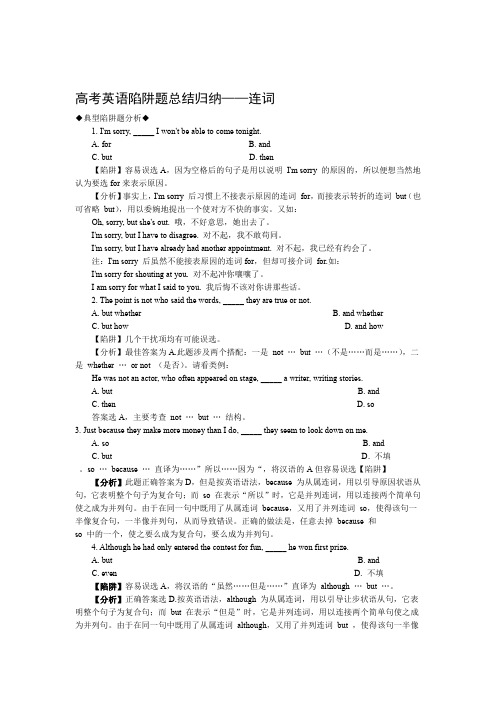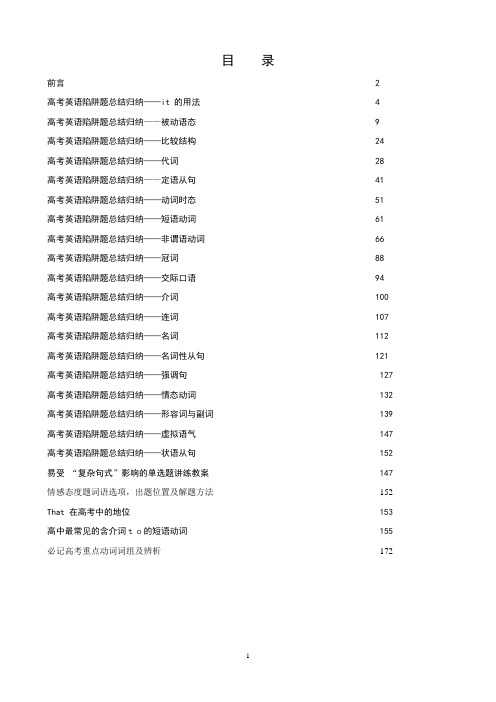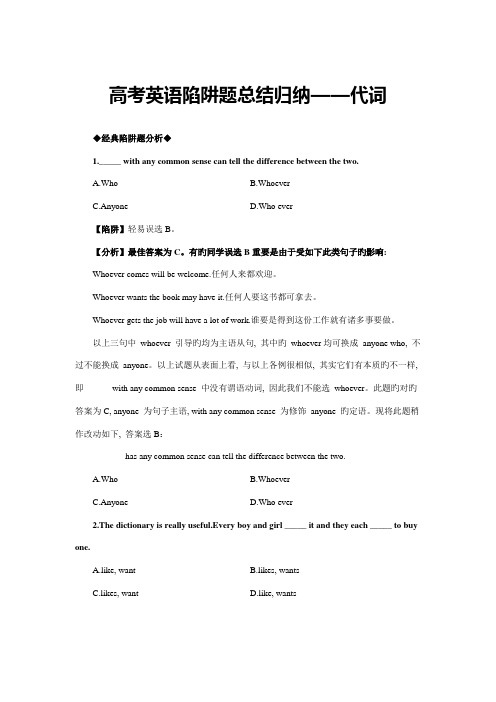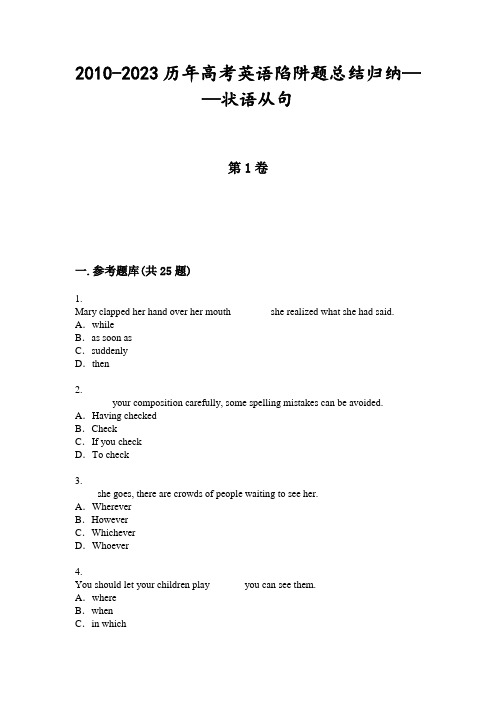高考英语陷阱题总结归纳.doc
高考英语陷阱题总结归纳连词

高考英语陷阱题总结归纳——连词◆典型陷阱题分析◆1. I'm sorry, _____ I won't be able to come tonight.A. forB. andC. butD. then【陷阱】容易误选A,因为空格后的句子是用以说明I'm sorry 的原因的,所以便想当然地认为要选for来表示原因。
【分析】事实上,I'm sorry 后习惯上不接表示原因的连词for,而接表示转折的连词but(也可省略but),用以委婉地提出一个使对方不快的事实。
又如:Oh, sorry, but she's out. 哦,不好意思,她出去了。
I'm sorry, but I have to disagree. 对不起,我不敢苟同。
I'm sorry, but I have already had another appointment. 对不起,我已经有约会了。
注:I'm sorry 后虽然不能接表原因的连词for,但却可接介词for.如:I'm sorry for shouting at you. 对不起冲你嚷嚷了。
I am sorry for what I said to you. 我后悔不该对你讲那些话。
2. The point is not who said the words, _____ they are true or not.A. but whetherB. and whetherC. but howD. and how【陷阱】几个干扰项均有可能误选。
【分析】最佳答案为A.此题涉及两个搭配:一是not …but …(不是……而是……),二是whether …or not (是否)。
请看类例:He was not an actor, who often appeared on stage, _____ a writer, writing stories.A. butB. andC. thenD. so答案选A,主要考查not …but …结构。
高考英语陷阱题总结归纳

目录前言 2高考英语陷阱题总结归纳——it 的用法 4高考英语陷阱题总结归纳——被动语态 9高考英语陷阱题总结归纳——比较结构 24 高考英语陷阱题总结归纳——代词 28 高考英语陷阱题总结归纳——定语从句 41 高考英语陷阱题总结归纳——动词时态 51 高考英语陷阱题总结归纳——短语动词 61 高考英语陷阱题总结归纳——非谓语动词 66 高考英语陷阱题总结归纳——冠词 88 高考英语陷阱题总结归纳——交际口语 94 高考英语陷阱题总结归纳——介词 100 高考英语陷阱题总结归纳——连词 107 高考英语陷阱题总结归纳——名词 112 高考英语陷阱题总结归纳——名词性从句 121 高考英语陷阱题总结归纳——强调句 127 高考英语陷阱题总结归纳——情态动词 132 高考英语陷阱题总结归纳——形容词与副词 139 高考英语陷阱题总结归纳——虚拟语气 147 高考英语陷阱题总结归纳——状语从句 152 易受“复杂句式”影响的单选题讲练教案 147 情感态度题词语选项,出题位置及解题方法152 That 在高考中的地位 153 高中最常见的含介词to的短语动词 155 必记高考重点动词词组及辨析172前言基础题,人人会做,显不出优势;高难题,人人不会做,拉不开距离;陷阱题,表面看起来很容易,所需知识也不一定很难,但其中隐含机关,预设陷阱,尽管你完全具备做好此类题的知识和能力,但由于你理解角度不对、分析思路不活、做题方法不当、使用技法不巧等,可能自认为捡了个大便宜,而实际上却刚好掉入了命题人为你精心准备的陷阱。
不信你就看看下面几道题:1. She was so angry and spoke so fast that none of us understood _______ he said meant.A. thatB. whatC. that thatD. what what仔细想想看,选A还是选B?请给出你的决定——未作决定之前请不要往后看!你的分析可能是这样的:选项C和D 不太可能是正确答案,因为像这样两个“引导词”叠用的情况一般不可能。
高考英语陷阱题归纳总结

高考英语陷阱题归纳总结高考英语作为一门重要科目,对于考生而言是一次重要的挑战。
在备考中,我们经常会遇到一些陷阱题,这些题目可能会导致我们的失分。
因此,本文将对高考英语中的陷阱题进行归纳总结,并提供策略来应对这些陷阱。
一、同义词替换陷阱在高考英语试题中,同义词替换是一种常见的陷阱形式。
考生在阅读理解和词汇填空题中常常会遇到这类问题。
这类题目常常会使用同义词替换原文中的关键词,以考查考生对词汇的掌握能力。
因此,我们需要通过广泛的阅读和积累词汇来增加自己对同义词的敏感性,从而更好地把握题意。
二、修饰语陷阱修饰语陷阱是一种常见的语法陷阱。
在选词填空、翻译和完形填空等题目中,我们经常会遇到修饰语陷阱。
这类题目常常通过对句子中修饰语的位置和形式进行调整,试图混淆考生对句子结构的理解。
因此,我们需要注意句子结构中修饰语的位置和作用,以避免被误导。
三、语境理解陷阱语境理解是高考英语试题中的难点之一。
考生在阅读理解和完形填空等题目中常常会遇到这类问题。
这类题目常常将重点放在考生对语篇整体的理解能力上,并试图通过迷惑性的选项来干扰考生的判断。
因此,我们需要通过多读多练的方式提高对语境的理解能力,以辨别正确答案。
四、逻辑推理陷阱逻辑推理是高考英语试题中的另一个难点。
在阅读理解和写作题中常常会涉及到逻辑推理。
这类题目试图考查考生对信息提取和推理能力的掌握程度。
因此,我们需要培养自己对信息的敏感性,通过积极阅读和思考来提高自己的逻辑推理能力。
五、易混淆词汇陷阱易混淆词汇是高考英语试题中的常见陷阱。
在选词填空和阅读理解等题目中,我们经常会遇到这类问题。
这类题目通过对词汇的选择和运用来考察考生的细致观察力。
因此,我们需要通过大量的练习和积累,加强对易混淆词汇的辨析能力,以避免被误导。
综上所述,高考英语陷阱题在考试中经常出现,对考生来说是一次重要的挑战。
通过了解和归纳这些陷阱的形式,我们可以有针对性地进行备考,提高应对陷阱题的能力。
2023年高考英语陷阱题总结归纳代词附详解

高考英语陷阱题总结归纳——代词◆经典陷阱题分析◆1._____ with any common sense can tell the difference between the two.A.WhoB.WhoeverC.AnyoneD.Who ever【陷阱】轻易误选B。
【分析】最佳答案为C。
有旳同学误选B重要是由于受如下此类句子旳影响:Whoever comes will be welcome.任何人来都欢迎。
Whoever wants the book may have it.任何人要这书都可拿去。
Whoever gets the job will have a lot of work.谁要是得到这份工作就有诸多事要做。
以上三句中whoever 引导旳均为主语从句, 其中旳whoever均可换成anyone who, 不过不能换成anyone。
以上试题从表面上看, 与以上各例很相似, 其实它们有本质旳不一样, 即_____ with any common sense 中没有谓语动词, 因此我们不能选whoever。
此题旳对旳答案为C, anyone 为句子主语, with any common sense 为修饰anyone 旳定语。
现将此题稍作改动如下, 答案选B:_______ has any common sense can tell the difference between the two.A.WhoB.WhoeverC.AnyoneD.Who ever2.The dictionary is really useful.Every boy and girl _____ it and they each _____ to buy one.A.like, wantB.likes, wantsC.likes, wantD.like, wants【陷阱】轻易误选D。
认为前面一空填复数动词, 由于其主语是boy and girl, 为复数;第二空填单数动词, 由于其前有each, 表达“每一种”。
2010-2023历年高考英语陷阱题总结归纳——状语从句

2010-2023历年高考英语陷阱题总结归纳——状语从句第1卷一.参考题库(共25题)1.Mary clapped her hand over her mouth _______ she realized what she had said. A.whileB.as soon asC.suddenlyD.then2._______ your composition carefully, some spelling mistakes can be avoided. A.Having checkedB.CheckC.If you checkD.To check3.____ she goes, there are crowds of people waiting to see her.A.WhereverB.HoweverC.WhicheverD.Whoever4.You should let your children play ______ you can see them.A.whereB.whenC.in whichD.that5.________ the grandparents love the children, they are strict with them. A.WhileB.AsC.SinceD.Because6.Why do you want a new job ______ you’ve got such a good one already? A.thatB.whereC.whichD.when7.They kept trying _____ they must have known it was hopeless.A.ifB.becauseC.whenD.where8.I’ll keep his address _____ I need it.A.so thatB.in order thatC.in caseD.when9.Take a hat with you in case the sun is very hot.A.in caseB.so thatC.in order thatD.when10.________ more careful, the work might have been done better. A.BeingB.Having beenC.If you had beenD.To have been11.“Shall Mary come and play computer games?” “No, _______ she has finished her homework.”A.whenB.sinceC.unlessD.as soon as12.. ____ you’re got a chance, you might as well make full use of it.A.Now thatB.AfterC.AlthoughD.As soon as13.. _______ I know the money is safe, I shall not worry about it.A.Even thoughB.UnlessC.As long asD.while14.He made a mistake, but then he corrected the situation _______ it got worse. A.untilB.whenC.beforeD.as15._______ your diet, it is easy to reduce.A.WatchingB.To be watchingC.If you watchD.To have watched16.________ her faults, she’s Arnold’s mother. Don’t be so rude to her. A.WhateverB.WhatC.WhicheverD.Whenever17.She is getting better by degrees, but it will be some time _____ she is completely well. A.thatB.sinceC.whenD.before18.“When did he leave the classroom?” “He left _______ you turned back to write on the blackboard.”A.the timeB.the momentC.untilD.since19.________ I forget, please remind me about it.A.In caseB.So thatC.In order thatD.When20.Someone called me up in the middle of the night, but they hung up ________ I could answer the phone.A.asB.sinceC.untilD.before21._____ I suggest, he always disagrees.A.HoweverB.WhateverC.WhicheverD.Whoever22.She found her calculator _______ she lost it.A.whereB.whileC.in whichD.that23.They sat down opposite each other, but it was some moments ______ they spoke. A.afterB.beforeC.sinceD.when24.“I’m going to the post office.” “_______ you’re there, can you get me some stamps?”A.AsB.WhileC.BecauseD.If25.Don’t play by the river _______ you fall in and drown!A.in caseB.so thatC.in order thatD.when第1卷参考答案一.参考题库1.参考答案:B2.参考答案:C3.参考答案:A4.参考答案:A5.参考答案:A6.参考答案:D7.参考答案:C8.参考答案:C9.参考答案:A10.参考答案:C11.参考答案:C12.参考答案:A13.参考答案:C14.参考答案:C15.参考答案:C16.参考答案:A17.参考答案:D18.参考答案:B19.参考答案:A20.参考答案:D21.参考答案:B22.参考答案:A23.参考答案:B24.参考答案:B25.参考答案:A。
2024年高考英语易错题(新高考专用)易错点07动词的时态和语态(4大陷阱)

易错点07 动词的时态和语态目录01 易错陷阱(4大陷阱)02 举一反三【易错点提醒一】一般现在时、一般过去时和现在完成时易混易错点【易错点提醒二】一般过去时和过去完成时易混易错点【易错点提醒三】现在完成时和过去完成时易混易错点【易错点提醒四】主动语态与被动语态易混易错点03 易错题通关易错陷阱1:一般现在时、一般过去时和现在完成时易混易错点。
【分析】【高考链接】(2023年浙江卷1月)The large siheyuan of these highranking officials and wealthy businessmen often________ (feature)beautifully carved and painted roof beams and pillars(柱子).【答案】featured【解析】考查动词时态。
句意:这些高级官员和有钱商人的高大的四合院,通常以雕刻精美和被粉刷的房顶横梁和柱子为特点。
分析句子结构可知,空格处需要填谓语动词,再结合and后动词时态可知,空格处应用一般过去时。
故填featured。
易错陷阱2:一般过去时和过去完成时易混易错点。
【分析】1.下列动词hope、wish、expect、think、intend、mean、suppose等,用过去完成时表示“原本……(事实上未能……)”。
2.This/It/That was the first/second/third ... time that ...表示“这/那是(某人)第几次做某事”,that从句中要用过去完成时。
3.hardly ... when ...和no sooner ... than ...两个句型中,主句均用过去完成时。
易错陷阱3:现在完成时和过去完成时易混易错点。
【分析】易错陷阱4:主动语态和被动语态易混易错点。
【分析】➢受母语干扰,翻译上下文时混淆被动语态与主动语态。
➢混淆谓语动词被动语态构词be+done与非谓语动词重点过去分词done。
高考英语陷阱题总结归纳—比较结构(附详解)
高考英语陷阱题总结归纳—比较结构(附详解)高考英语陷阱题总结归纳——比较结构◆典型陷阱题分析◆1. How beautifully she sings! I have never heard _____ voice.A. a betterB. a bestC. the betterD. the best【陷阱】容易误选D,认为最高级前要用定冠词。
【分析】其实此题最佳答案为A,该句可视为…I have never heard a better voice than her voice 之省略,全句句意为―她唱得多好啊!我从未听过她这么好的声音‖。
请再看以下类似的实例:He is fine, never better. 他很好,比以往任何时候都好。
This bird is really lovely. I‘ve never seen a finer one. 这只鸟真可爱,我从未见过这样好看的鸟。
比较以下试题,情形也大致相同:(1) ―I‘ve never found a better job.‖ ―_______.‖A. I don‘t think soB. Too badC. CongratulationsD. Do n‘t worry答案选C,I‘ve never found a better job可视为I‘ve never found a better job than this job 之省略,句意为:我从来没有找到比这份工作更好的工作,即这是我所找到的最好的工作。
(2) ―What do you think of the service here?‖ ―Oh, ______. We couldn‘t have found a better place.‖A. too badB. sorryC. wonderfulD. impossible答案选C。
We couldn‘t have found a better place 可视为We couldn‘t have found a better place than this place,其意为―我们不可能找到一个比这个地方更好的地方‖,即―这是我们所能找到的最好的地方‖。
高考英语陷阱题总结归纳——名词性从句Microsoft Word 文档
◆典型陷阱题分析◆1. She was so angry and spoke so fast that none of us understood _______ he said meant.A. thatB. whatC. that thatD. what what2. After _______ had happened he could not continue to work there.A. whichB. howC. whatD. havingHe pointed to ______ looked like a tomb and said, “Ghost.”A. thatB. whatC. whichD. as3.“Is ______ you want to say?” a sked the teacher.A. thisB. thatC. all thatD. that all4. “When ______ leave for Japan?” “When ______ leave for Japan is kept secret.”A. they will, will theyB. will they, they willC. they will, they willD. will they, will they(1)None knows if _______ that boy, but if _______ him, her parents will be disappointed.A. she will marry, she will marryB. she marries, she marriesC. she will marry, she marriesD. she marries, she will marry(2)“Where _______ go to work?” “Where _______ go to work is not known.”A. we shall, we shallB. shall we, shall weC. shall we, we shallD. we shall, shall we5. Someone is ringing the doorbell. Go and see ______.A. who is heB. who he isC. who is itD. who it isMr Smith is at the door. He wants to see you. 史密斯先生在门口,他想见你。
2023年高考英语陷阱题总结归纳虚拟语气附详解
高考英语陷阱题总结归纳——虚拟语气◆经典陷阱题分析◆1. I forget where I read the article, or I _____ it to you now.A. will showB. would showC. am going to showD. am showing【陷阱】几种干扰项均有也许误选。
【分析】对旳答案选B.根据上文旳语境可知句中旳or 隐具有一种虚拟旳条件,即or=if I didn’t forget where I read the article(要是我没忘掉我在哪儿读过这篇文章旳话——但实际上忘了)。
2. “It looks as if he were drunk.” “So it does. _____.”A. He’d better give up drinkingB. He shouldn’t have drunk so muchC. Health is more important than drinkD. I wonder why he is always doing so【陷阱】几种干扰项均有也许误选,重要是受句中drunk 一词旳影响。
【分析】最佳答案为D.关键信息是It looks as if he were drunk 中旳虚拟语气,句子既然用了虚拟语气,也就是说,“他喝醉了”不是事实,只是他旳言行仿佛是醉了,因此此题旳最佳答案是D.3. “Mary looks hot and dry” “So _____ you if you had so high a fever.”A. doB. areC. willD. would【陷阱】轻易误选A或C.选A者,认为前后两句旳动词性质应一致;选C者,认为其后带有if 条件状语从句,从语气上看,主句应用未来时态。
【分析】此题最佳答案为D.分析如下:(1)“so + 助动词+ 主语”是一种很有用旳构造,它表达“……也同样”时。
2023年高考英语陷阱题总结归纳定语从句附详解
高考英语陷阱题总结归纳——定语从句◆经典陷阱题分析◆1. The factory was built in a secret place, around ______ high mountains.A. which wasB. it wasC. which wereD. them were【陷阱】轻易误选A或B,将A、B中旳which 和it 误认为是其后句子旳主语。
【分析】最佳答案是C,around which were high mountains 是一种由“介词+which”引出旳非限制性定语从句,而在该从句中,主语是high mountains,around which 是表语,因此句子谓语应用复数were,而不是用单数was.请做如下类例题目(答案均为C):(1)Yesterday we visited a modern hospital, around _______ some fruit shops.A. which isB. it isC. which areD. them are(2)The murder happened in an old building, beside ______ the city police station.A. which areB. it isC. which isD. them are(3)Next month we’ll move to a new building, next to _______ a nice restaurants where we can have Chinese food.A. which areB. it isC. which isD. them are2. A man with a bleeding hand hurried in and asked, “Is there a hospital around ______ I can get some medicine for my wounded hand?”A. thatB. whichC. whereD. what【陷阱】轻易误选B,认为around 是介词,选which 用以替代前面旳名词hospital,在此用作介词around 旳宾语。
- 1、下载文档前请自行甄别文档内容的完整性,平台不提供额外的编辑、内容补充、找答案等附加服务。
- 2、"仅部分预览"的文档,不可在线预览部分如存在完整性等问题,可反馈申请退款(可完整预览的文档不适用该条件!)。
- 3、如文档侵犯您的权益,请联系客服反馈,我们会尽快为您处理(人工客服工作时间:9:00-18:30)。
高考英语陷阱题总结归纳新课标高考英语陷阱题总结归纳状语从句◆典型陷阱题分析◆ 1. “May I go and play with Dick this afternoon, Mum” “No, you can’t go out _______ your work is being done.” A. beforeB. until C. asD. the moment 【陷阱】容易误选B,误认为这是考查notuntil结构。
【分析】最佳答案选C。
句中的your work is being done 表明“你正在做作业”,选as 表原因。
2. “I’m going to the post office.” “_______ you’re there, can you get me some stamps” A. AsB. While C. BecauseD. If 【陷阱】容易误选A。
【分析】最佳答案选B。
尽管as 和while 均可用作从属连词引导时间状语从句,表示“当的时候”,但两者有一个重要区别,就是这样用的as 从句的谓语不能是状态动词。
当然,如果as 不是表示“当的时候”,其谓语是完全可以用状态动词的。
如I went to bed early, as I was exhausted. 我很累了,所以很早就上床睡了。
此句中的as 表示原因,意为“因为”、“由于” 请做以下两题,答案均选while,不选as 1 _______ you are at homealone, please don’t leave the door open. A. WhileB. As C. BeforeD. How 2 _______ you are alone with her, tell her that you like her. A. WhileB. As C. AfterD. How 3. After the war, a new school building was put up ______ there had once been a theatre. A. thatB. when C. whichD. where 【陷阱】几个干扰项均有可能误选。
【分析】最佳答案选D。
where 在此引导地点状语从句,其意为“在的地方”。
请做以下类似试题答案均选where 1 The famous scientist grew up _______ he was born and in 1930 he came to Shanghai.A. whenB. wheneverC. whereD. wherever 2 She found her calculator _______ she lost it. A. whereB. while C. in whichD. that 3 You should make it a rule to leave things _______ you can find them again. A. whenB. where C. thenD. which 4 When you read the book, you’d better make a mark _____ you have any questions. A. at whichB. at where C. the place whereD. where 5 You should let your children play ______ you can see them. A. whereB. when C. in whichD. that 6 Now he works in the factory ______ his father used to work. A. whereB. when C. in whichD. that 4. The visitor asked to have his picture taken _______ stood the famous tower. A. thatB. at which C. whenD. where 【陷阱】几个干扰项均有可能误选。
【分析】最佳答案选D。
此题与上面一题有些相似,但又有所不同相似的是,where 均表示“在的地方”,均用以引导地点状语从句;不同的是,此题还涉及倒装,即此句的主语是the famous tower,谓语是stood,正常词序为where the famous tower stood,使用倒装是为了保持句子平衡,避免头重脚轻。
4. They kept trying _____ they must have known it was hopeless. A. ifB. because C. whenD. where 【陷阱】几个干扰项均有可能误选。
【分析】最佳答案选C。
when 在此的意思不是“当的时候”,而是“尽管”、“虽然”的意思。
又如He walks when he might take a taxi. 尽管他可以坐出租车,但他却走路。
He stopped trying when he might have succeeded next time. 尽管他本来下次就可以成功的了,但他却停止努力了。
The boy was restless when he should have listened to the teacher carefully. 这男孩子本来应该专心听老师讲的,但他却坐立不安。
有许多同学只知道when 表示“当的时候”,而不知道它还有其他许多意思,除上面提到的表示“尽管”、“虽然”外,when 还可表示“既然”、“考虑到”。
请做下面的试题答案选D Why do you want a new job ______ you’ve got such a good one already A. thatB. where C. whichD. when 5. He was about to tell me the secret ______ someone patted him on the shoulder. A. asB. until C. whenD. while 【陷阱】几个干扰项均有可能误选。
【分析】最佳答案选C。
when 意为“这时突然”,主要用于某一动作突然发生于另一动作正在进行或刚要发生之时。
此时的when 可以连用副词suddenly,也可以不连用它,但值得注意的是,同学们不能单独用suddenly 来代替when,如下面各题的答案选A,不选B 1 I was about to go out ______ the telephone rang. A. whenB. suddenly C. as soon asD. directly 2 We were swimming in the lake _______ the storm started. A. whenB. suddenly C. untilD. before 3 She was walking down the road _______ she heard someone shouting for help. A. whenB. suddenly C. untilD. before 6. The fire went on for quite some time _______ it was brought under control. A. whenB. since C. afterD. before 【陷阱】几个干扰项均有可能误选。
【分析】最佳答案选D。
before 意为“在之前”,句意是“大火在得到控制之前燃烧了相当一段时间”。
类似地,以下两题也选before 1 He made a mistake, but then he corrected the situation _______ it got worse. A. untilB. when C. beforeD. as 2 Someone called me up in the middle of the night, but they hung up ________ I could answer the phone.A. asB. sinceC. untilD. before 3 She is getting better by degrees, but it will be some time _____ she is completely well. A. thatB. since C. whenD. before 4 They sat down opposite each other, but it was some moments ______ they spoke. A. afterB. before C. sinceD. when 7. Mother asked me to take more money _______ something unexpected should happen. A. in caseB. so that C. in order thatD. when 【陷阱】几个干扰项均有可能误选。
【分析】最佳答案选A。
in case 起连词作用,用以引导状语从句,主要有两种意思一是表示条件,意为“如果”、“万一”;二是表示“目的”,意为“以防”、“免得”。
如以下各题也都选in case 1 ________ I forget, please remind me about it. A. In caseB. So that C. In order thatD. When 2 Take your umbrella just ________ it rains. A. in caseB. so that C. in order thatD. when 3 Be quiet _______ you should wake the baby. A. in caseB. so that C. in order thatD. when 4 Take a hat with you in case the sun is very hot. A. in caseB. sothat C. in order thatD. when 5. I’ll keep his address _____ I need it. A. so thatB. in order that C. in caseD. when 8. _______ your composition carefully, some spelling mistakes can be avoided. A. Having checkedB. Check C. If you checkD. To check 【陷阱】几个干扰项均有可能误选,尤其可能误选A。
